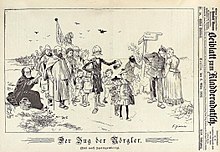Franz Albert Jüttner
Franz Albert Jüttner (often just Franz Jüttner , born April 23, 1865 in Lindenstadt (Polish: Lipowiec) near Birnbaum , Posen ; † May 1, 1926 in Wolfenbüttel ) was a German illustrator , draftsman and caricaturist . He was an employee of the Kladderadatsch and after founding the Lustige Blätter in 1896 its most printed draftsman.
Life
Jüttner was born the son of a cooper . After finishing school, he first worked as a draftsman for the local master builder in Birnbaum. In 1880 he moved to Berlin, where his older brother lived. After a brief activity as a decorative painter and reproducing draftsman in a lithographic institution, he trained as an illustrator under Ludwig Burger , but was essentially self-taught as a draftsman and caricaturist . His breakthrough as a cartoonist came in the 1880s. He became one of the “star draftsmen” of the Berlin Lustige Blätter. Soon he was represented in practically every issue with partly full-page, colored drawings. Jüttner started a family and continued to live in Berlin. The hoped-for success as an artist, ie as a painter, was denied to him. During the First World War he suffered a serious crisis in 1917, as a result of which he did not or hardly draw for a long time until 1918. On the advice of a doctor, he and his family moved to quiet Wolfenbüttel on October 1, 1918. Here he was a respected member of society. Franz Jüttner died unexpectedly on May 1, 1926.
plant
His first works appeared in Dorfbarbier and as illustrations for novels and books for young people. Jüttner turned to political caricature after spending a year at the Berliner Wespen magazine . "In his always measured, good-natured, humorous way, the busy man commented on all the events of the Wilhelmine era and recorded a large number of characters with a pen." From 1887 to 1892 Jüttner made contributions to the Kladderadatsch and from 1887 to 1917 for the Lustige Blätter ; he also worked for the flying leaves .
One of his most successful drawings was Der Zug der Nagger , which caricatured a corresponding saying by Kaiser Wilhelm II during a dinner speech in 1892: “ Unfortunately, it has now become the custom to grapple with everything that happens on the part of the government. But it would be better that the disgruntled complainers would rather shake the German dust off their slippers and withdraw from our miserable and miserable conditions. They would then be helped, and they would do us a great favor . "Jüttner implemented this masterfully by instructing all those who - with good reason - had to" grapple "with the status quo in the German Reich on their way" out " showed. It was implied that if everyone left, as the emperor wished, none of his subjects would be there ... At the same time, this caricature was a parody of the painter Gustav Spangenberg's train of death .
During the First World War , Jüttner drew hundreds of propaganda caricatures for the Lustige Blätter . However, this activity ended abruptly with its collapse in 1917.
After his recovery and until the end of the war and afterwards, Jüttner practically exclusively focused on scenes of bourgeois humor. The changes in style in the course of the 1920s could not - or did not want - to go along with the full extent. Another field of activity opened up with the design of emergency notes , in which he graphically implemented historical motifs.
In addition to his caricatures, which probably number in the thousands, Jüttner also left behind other artistic works. He made oil paintings and drawings, for example for children's books or cigarette pictures, but also advertising posters and the like. This aspect of his oeuvre is largely unexplored so far (2019).
reception
After his death, Jüttner was largely forgotten. Only in 2018 was his life and work honored in a summarizing article. From October 31, 2018 to April 14, 2019, the Steinhorst School Museum will be showing a special exhibition on Franz Jüttner. Under the title " World fire and caricature: Franz Jüttner - an artist comments on the First World War ", originals of his propaganda caricatures for the Lustige Blätter from the years 1914 to 1917 , never before publicly shown, can be seen here. It is the first public exhibition of Jüttner's work in more than nine decades.
literature
- Thieme-Becker
- Eduard Fuchs : The caricature of the European peoples II , page 338
- Georg Piltz : History of European Literature , page 219 ff
- Kurt Flemig : Caricaturists Lexicon , page 138
- Arne Homann (Ed.): World fire and caricature: Franz Jüttner - an artist comments on the First World War . Steinhorst, Steinhorst School Museum, 2018.
- Eckart Sackmann : Franz Jüttner, painter and illustrator . In: Deutsche Comicforschung 14 (2018), pp. 7–27.
Web links
Individual evidence
- ^ Caricaturist Lexicon, Kurt Fleming, KGSaur, 1993, page 138; Sackmann 2018.
- ^ Thieme-Becker : General Lexicon of Visual Artists
- ^ Sackmann: Franz Jüttner . 2018.
- ^ Conrad Bornhak : German history under Kaiser Wilhelm II . Leipzig 1921, page 36
- ↑ Homann: World fire and caricature . 2018.
- ^ Sackmann: Franz Jüttner . 2018.
- ^ Sackmann: Franz Jüttner . 2018.
- ↑ Homann: World fire and caricature . 2018.
| personal data | |
|---|---|
| SURNAME | Jüttner, Franz Albert |
| ALTERNATIVE NAMES | Jüttner, Franz |
| BRIEF DESCRIPTION | German illustrator, draftsman and caricaturist |
| DATE OF BIRTH | April 23, 1865 |
| PLACE OF BIRTH | Lindenstadt near Birnbaum, Posen |
| DATE OF DEATH | May 1, 1926 |
| Place of death | Wolfenbüttel |




